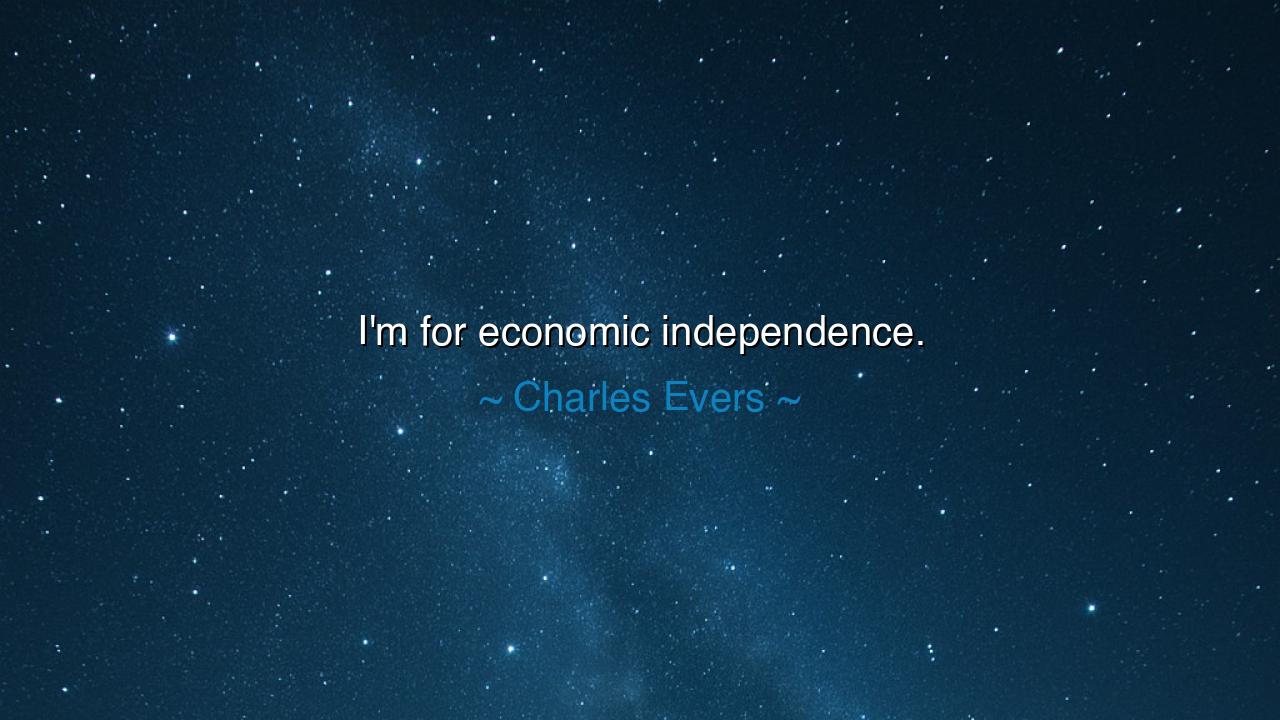
I'm for economic independence.






“I’m for economic independence.” — Charles Evers
These words, spoken by Charles Evers, carry the force of a lifetime’s struggle and the wisdom of generations who sought to rise from bondage into dignity. In their simplicity lies an ocean of truth: that freedom without self-reliance is fragile, and independence without economic strength is incomplete. Evers, a man forged in the crucible of the American civil rights movement, knew that liberty could not rest on protest alone; it must be built upon the foundation of ownership, enterprise, and control over one’s destiny. His declaration is not merely political — it is moral, spiritual, and eternal. To be economically independent is to reclaim the power that no oppressor can bestow and no tyrant can take away.
To understand the origin of this quote, one must understand the man. Charles Evers, the brother of the slain civil rights leader Medgar Evers, carried forward the torch of justice not only in the courts and streets, but in the marketplace. He became the first Black mayor of a Mississippi town since Reconstruction, and he believed that true equality could not be achieved until Black Americans controlled their own businesses, their own banks, and their own lands. He looked upon his people and saw that political rights meant little if hunger ruled the home, if the hand that votes still trembled in poverty. Thus he declared, “I’m for economic independence” — a creed that turned protest into purpose, and survival into empowerment.
The meaning of his words reaches beyond time and color, for they speak to the essence of all human freedom. Economic independence is not merely the possession of wealth, but the power to shape one’s life according to one’s values. It is the strength to speak truth without fear of losing livelihood, to act with integrity without bowing to dependence. The man who must beg for bread cannot afford to stand upright. But the one who earns by his own hands — who builds, trades, and provides — becomes as unshakable as a mountain. Evers understood that the struggle for justice must be joined with the pursuit of self-sufficiency, for freedom without bread is hollow, and bread without freedom is tasteless.
History is filled with the echoes of this truth. Think of Booker T. Washington, who founded the Tuskegee Institute and preached that the road to racial uplift began with industry, skill, and ownership. “No race that has anything to contribute to the markets of the world is long in any degree ostracized,” he said. Through craftsmanship and enterprise, his people could forge respect where laws had failed to grant it. And in another land, centuries before, the Israelites, newly freed from Egypt, learned that liberation meant not only escape from slavery, but the hard labor of cultivating their own fields in the wilderness. Freedom, they discovered, must be fed daily by the sweat of one’s brow and the discipline of creation.
So too did Charles Evers see that economic independence was the second Exodus — the passage from reliance to responsibility. He knew that those who control the means of production, the flow of money, and the ownership of property control the destiny of nations. “Power,” he said, “comes from the pocketbook.” Without it, no people can sustain their freedom; with it, they can build schools, defend their communities, and pass on a legacy of strength rather than struggle. His vision was not selfish ambition — it was the call for a collective awakening, a reminder that dignity is sustained not by charity, but by enterprise, discipline, and ownership.
In this, Evers’s message speaks to all who would rise — to the young worker seeking purpose, to the entrepreneur daring to dream, to the citizen yearning for control over their life. Economic independence is not the privilege of the wealthy, but the right of every soul who labors with honesty and wisdom. It begins with small acts: saving when it is easier to spend, building when others consume, choosing patience over indulgence. To master one’s resources is to master one’s fate. As the ancients said, “He who conquers himself is greater than he who conquers a city.” So too, he who governs his economy governs his freedom.
Let this be the lesson passed to future generations: do not place your destiny in the hands of others. Build, learn, and create so that your freedom rests not upon permission, but upon power. Stand not as a petitioner before kings, but as a steward of your own kingdom. The spirit of Charles Evers calls to you still — to labor with dignity, to spend with purpose, to save with vision, and to share with wisdom. For in this lies the truest form of liberty: a freedom that is not granted, but earned, and a pride that no chain can bind.
Remember always, as Evers did, that the cry for justice must be joined with the work of independence. For the hand that holds the tools of creation is the hand that shapes the world.






AAdministratorAdministrator
Welcome, honored guests. Please leave a comment, we will respond soon